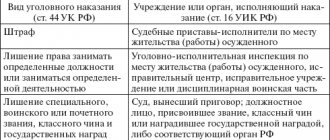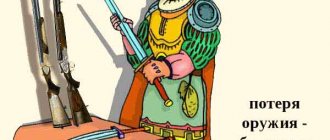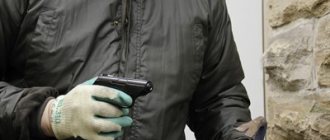Criminal Code of the Russian Federation in the latest edition:
Article 146 of the Criminal Code of the Russian Federation. Violation of copyright and related rights
1. Assignment of authorship (plagiarism), if this act caused major damage to the author or other copyright holder, -
shall be punishable by a fine in the amount of up to two hundred thousand rubles, or in the amount of the wages or other income of the convicted person for a period of up to eighteen months, or by compulsory labor for a term of up to four hundred and eighty hours, or by corrective labor for a term of up to one year, or by arrest for a term of up to six months.
2. Illegal use of objects of copyright or related rights, as well as the acquisition, storage, transportation of counterfeit copies of works or phonograms for sales purposes, committed on a large scale, -
shall be punishable by a fine in the amount of up to two hundred thousand rubles, or in the amount of the wages or other income of the convicted person for a period of up to eighteen months, or by compulsory labor for a term of up to four hundred eighty hours, or by corrective labor for a term of up to two years, or by forced labor for a term of up to two years. , or imprisonment for the same period.
3. Acts provided for in part two of this article, if committed:
a) has become invalid. — Federal Law of December 8, 2003 N 162-FZ;
b) by a group of persons by prior conspiracy or an organized group;
c) on an especially large scale;
d) by a person using his official position, -
shall be punishable by forced labor for a term of up to five years, or by imprisonment for a term of up to six years, with or without a fine in the amount of up to five hundred thousand rubles or in the amount of the wages or other income of the convicted person for a period of up to three years.
Note. The acts provided for in this article are recognized as committed on a large scale if the cost of copies of works or phonograms or the value of the rights to use objects of copyright and related rights exceeds one hundred thousand rubles, and in an especially large amount - one million rubles.
Return to the table of contents of the document: Criminal Code of the Russian Federation in the latest edition
Comments on Article 146 of the Criminal Code of the Russian Federation
For the correct application of the norms of criminal law, one should take into account the explanations of the Plenum of the Supreme Court of the Russian Federation, given in Resolution No. 14 of April 26, 2007 “On the practice of courts considering criminal cases of violation of copyright, related, inventive and patent rights, as well as illegal use of a trademark "
Object of crime . The main direct object of the crime is intellectual property, copyright or related rights, which are understood as the rights of authors and persons with related rights (performing artists, organizers of broadcasting and sound recording, etc.).
An additional direct object is the property interests of authors or other copyright holders.
Victims in criminal cases involving crimes under Art. 146 of the Criminal Code of the Russian Federation, can be authors, performers, producers of phonograms, broadcasting organizations, and other persons (both individuals and legal entities) to whom copyright or related rights belong on the basis of law, are inherited or by contract.
The subject of the crime is someone else’s work (literary, artistic, scientific, technical) or reproduced by the perpetrator and other creative products.
The subject of the crime in case of copyright infringement is the objects of copyright, which are works of science, literature and art, regardless of the merits and purpose of the work, as well as the method of its expression (Article 1259 of the Civil Code of the Russian Federation):
- literary works;
- dramatic and musical-dramatic works, screenplays;
- choreographic works and pantomimes;
- musical works with or without text;
- audiovisual works;
- works of painting, sculpture, graphics, design, graphic stories, comics and other works of fine art;
- works of decorative, applied and scenographic art;
- works of architecture, urban planning and landscape art, including in the form of projects, drawings, images and models;
- photographic works and works obtained by methods similar to photography;
- geographical and other maps, plans, sketches and plastic works related to geography and other sciences;
- other works.
Objects of copyright also include computer programs, which are protected as literary works.
Objects of copyright include:
- derivative works, that is, works that are a reworking of another work;
- composite works, that is, works that, by the selection or arrangement of materials, represent the result of creative labor.
When deciding whether the crime in question exists, it should be borne in mind that copyright extends to both published and unpublished works of science, literature and art that are the result of creative activity and exist in any objective form (written, oral, sound). - or video recording, visual, volumetric-spatial).
The creation, exercise and protection of copyright does not require registration of a work or compliance with any other formalities.
In relation to computer programs and databases, registration is possible, carried out at the request of the copyright holder in accordance with the rules of Art. 1262 of the Civil Code of the Russian Federation.
Copyright does not apply to ideas, concepts, principles, methods, processes, systems, methods, solutions to technical, organizational or other problems, discoveries, facts, programming languages.
Are not subject to copyright:
- official documents of state bodies and local governments of municipalities, including laws, other regulations, court decisions, other materials of a legislative, administrative and judicial nature, official documents of international organizations, as well as their official translations;
- state symbols and signs (flags, coats of arms, orders, banknotes, etc.), as well as symbols and signs of municipalities;
- works of folk art (folklore) that do not have specific authors;
- messages about events and facts that are purely informational in nature (news reports of the day, TV programs, vehicle schedules, etc.).
Objects of related rights include (Article 1304 of the Civil Code of the Russian Federation):
- the results of performing activities (performance), which include performances by performing artists and conductors, if these performances are expressed in a form that allows them to be reproduced and distributed using technical means, productions by stage directors, if these productions are expressed in a form that allows them to be carried out repeated public performance while maintaining the recognition of a specific production by the audience, as well as in a form that allows reproduction and distribution using technical means;
- phonograms, that is, any exclusively sound recordings of performances or other sounds or their representations, with the exception of a sound recording included in an audiovisual work;
- messages from programs of broadcasting or cable broadcasting organizations, including programs created by the broadcasting or cable broadcasting organization itself or on its order at the expense of its funds by another organization;
- databases in terms of their protection from unauthorized extraction and reuse of the materials that comprise their contents;
- works of science, literature and art, published after they have entered the public domain, in terms of protecting the rights of publishers of such works.
Commentary to Art. 146 Criminal Code
1. Most of the elements of this crime are disclosed in Resolution of the Plenum of the Supreme Court of the Russian Federation dated April 26, 2007 No. 14 “On the practice of courts considering criminal cases of violation of copyright, related, inventive and patent rights, as well as illegal use of a trademark.”
2. The objective side is characterized by: a) an action in the form of misappropriation of authorship (Part 1), resulting in major damage (property (material) damage); b) illegal use of copyright or related rights, or acquisition, storage, transportation of counterfeit copies of works or phonograms (Part 2), committed on a large scale (note to the article).
Part 1 art. 146 of the Criminal Code of the Russian Federation
The objective side of the crime under Part 1 of Art. 146 of the Criminal Code of the Russian Federation, is expressed in an act in the form of misappropriation of authorship (plagiarism) , the occurrence of socially dangerous consequences in the form of major damage and a causal connection between them.
Plagiarism is the publication of a work by another author under one’s own name. In this case, plagiarism will be the publication of both the full volume of another author’s work and the use of part of it in one’s own work. Plagiarism can also be expressed in the publication of a work written in co-authorship without indicating the name of the co-author.
co-authors are citizens who have created a work through joint creative work, regardless of whether such a work forms an inseparable whole or consists of parts, each of which has independent significance.
Thus, appropriation of authorship (plagiarism) is declaring oneself the author (co-author) of someone else’s work for the purpose of using copyrights (plagiarism), publishing or using under one’s own name or one’s pseudonym someone else’s work in whole or in part. Co-authorship under duress should also be considered as appropriation of authorship.
Causing major damage to the author or other copyright holder is a mandatory sign of the objective side of the crime.
Large size is considered to be the cost of copies of works or phonograms or the cost of rights to use objects of copyright and related rights exceeding 100 thousand rubles.
The corpus delicti is material. The act is completed from the moment major damage is caused.
Part 2 Art. 146 of the Criminal Code of the Russian Federation
Part 2 of Article 146 of the Criminal Code of the Russian Federation establishes criminal liability for the illegal use of objects of copyright or related rights, as well as the acquisition, storage, transportation of counterfeit copies of works or phonograms for sales purposes, committed on a large scale .
The objective side of this crime is formed by alternative actions in the form of:
- illegal use of copyright or related rights;
- illegal acquisition, storage, transportation of counterfeit copies of works or phonograms, committed on a large scale.
Unlawful use means the distribution or reproduction of a copyrighted work without the consent of the author or other copyright holder.
As noted in paragraph 4 of the Resolution of the Plenum of the Armed Forces of the Russian Federation dated April 26, 2007 N 14, illegal within the meaning of Art. 146 of the Criminal Code should be considered the deliberate use of objects of copyright and related rights, carried out in violation of the provisions of the current legislation of the Russian Federation, which regulates relations arising in connection with the creation and use of works of science, literature and art, phonograms, performances, productions, broadcasts of broadcasting or cable broadcasting organizations .
Counterfeit refers to copies of a work and phonogram, the production or distribution of which entails a violation of copyright and related rights.
Copies of works and phonograms protected in the Russian Federation that are imported without the consent of the holders of copyright and related rights into the Russian Federation from a state in which these works and phonograms have never been protected or have ceased to be protected are also counterfeit.
The acquisition of counterfeit copies of works or phonograms consists of their receipt by a person as a result of any transaction for the transfer of ownership, economic management or operational management (for example, as a result of purchase and sale, barter, or upon receipt of these items as remuneration for work done, service provided or as a means of fulfilling debt obligations).
The storage of counterfeit copies of works or phonograms should be understood as any deliberate actions related to their actual possession (in a warehouse, in places of trade, production or rental, in a home, hiding place, etc.), and transportation - their deliberate movement by any kind transport from one location to another, including within the same locality.
The sale of counterfeit copies of works or phonograms consists of their deliberate provision for a fee or free of charge to other persons in any way (for example, through sale, rental, free distribution for advertising purposes, donation, posting works on the Internet). The presence of a person with a sales goal can be confirmed, in particular, by the presence of seized counterfeit copies in retail outlets, rental points, warehouses, etc., and the number of these items.
The corpus delicti is material. The crime is completed from the moment the socially dangerous consequences, mentioned above, occur.
A person may be brought to criminal liability under Part 1 of Art. 146 (plagiarism) only if major damage .
Considering that in relation to Part 1 of Art. 146 of the Criminal Code of the Russian Federation, damage that can be recognized by the court as major is not specified in the law, paragraph 24 of the Plenum Resolution notes that when establishing it, the courts must proceed from the circumstances of each specific case (for example, from the presence and amount of actual damage, the amount of lost profits, the amount of income received by a person as a result of his violation of rights to the results of intellectual activity or to means of individualization). In this case, the provisions of Art. 15 of the Civil Code of the Russian Federation, according to which, if a person who violated a right received income as a result, the person whose right was violated has the right to demand compensation, along with other damages, for lost profits in an amount not less than such income.
Article 146. Infringement of copyright and related rights
Resolution of the Presidium of the Supreme Court of the Russian Federation dated February 14, 2018 N 299P17 Samvel Vormistovich Sahakyan, ... convicted on December 30, 1994 under paragraph “a” of Part 2 of Art. 146 of the Criminal Code of the RSFSR to imprisonment for a term of 6 years, released from prison on June 2, 2000 after serving his sentence,
Resolution of the Presidium of the Supreme Court of the Russian Federation dated July 4, 2018 N 97P18
Demakov Sergey Anatolyevich, ... convicted on April 29, 1996 under Part 3 of Art. 144, part 1 art. 218, part 2 art. 218 part 3 art. 146, paragraphs “a”, “d”, “e” art. 102 of the Criminal Code of the RSFSR, on the basis of Art. Criminal Code of the RSFSR to 14 years in prison, released on December 30, 2005 on parole for an unserved term of 3 years 3 months 11 days,
Appeal ruling of the Judicial Collegium for Military Personnel of the Supreme Court of the Russian Federation dated July 24, 2018 N 208-APU18-9
Yudin Alexander Viktorovich, ... convicted on July 29, 2015 by the Magadan City Court of the Magadan Region under paragraph “c” of Part 3 of Art. 146 of the Criminal Code of the Russian Federation to imprisonment for a term of 2 years suspended with a probationary period of 2 years, which was extended by a decision of the same court dated May 3, 2017 for 4 months,
Cassation ruling of the Judicial Collegium for Criminal Cases of the Supreme Court of the Russian Federation dated August 23, 2018 N 46-O18-1
Demakov Sergey Anatolyevich, ..., convicted on April 29, 1996 under Part 3 of Art. 144, part 1 art. 218, part 2 art. 218, part 3 art. 146, paragraphs “a”, “d”, “e” art. 102 of the Criminal Code of the RSFSR using Art. Criminal Code of the RSFSR to 14 years in prison, released on December 30, 2005 on parole by court order of December 19, 2005 for an unserved term of 3 years 3 months 11 days,
Appeal ruling of the Judicial Collegium for Criminal Cases of the Supreme Court of the Russian Federation dated August 28, 2018 N 78-APU18-15
1) September 6, 1997 under paragraphs “a”, “b”, “c” of Part 2 of Art. 146, paragraphs “a”, “n”, part 2 of Art. 102, art. and paragraphs “a”, “z”, “n”, part 2 of Art. 102, part 1 art. 222 of the Criminal Code of the RSFSR to 15 years in prison;
Resolution of the Presidium of the Supreme Court of the Russian Federation dated November 14, 2018 N 115-P18
Trushin Gennady Viktorovich, ... (taking into account the changes made by the decision of the Stavropol Regional Court of September 27, 2013, should be considered the date of birth ...), ur. ... previously convicted: February 15, 1994 under paragraphs “a”, “b”, part 2 of Art. 146 of the Criminal Code of the RSFSR using Art. Criminal Code of the RSFSR to 3 years 6 months imprisonment; April 18, 1994 under Part 2 of Art. 144 of the Criminal Code of the RSFSR to 1 year 6 months of imprisonment, on the basis of Part 3 of Art. Criminal Code of the RSFSR finally to 3 years 6 months of imprisonment, released on April 9, 1996 on parole for 1 year 1 month 3 days,
Determination of the Constitutional Court of the Russian Federation dated December 19, 2017 N 2873-O
THIRD ARTICLE 146 OF THE CRIMINAL CODE OF THE RUSSIAN FEDERATION The Constitutional Court of the Russian Federation, composed of Chairman V.D. Zorkin, judges K.V. Aranovsky, A.I. Boytsova, N.S. Bondar, G.A. Gadzhieva, Yu.M. Danilova, L.M. Zharkova, S.M. Kazantseva, S.D. Knyazeva, A.N. Kokotova, L.O. Krasavchikova, S.P. Mavrina, N.V. Melnikova, Yu.D. Rudkina, O.S. Khokhryakova, V.G. Yaroslavtseva,
Determination of the Constitutional Court of the Russian Federation dated January 30, 2020 N 261-O
Clause “c” of part three of Article 146 of the Criminal Code of the Russian Federation provides for criminal liability for the illegal use of objects of copyright or related rights, as well as the acquisition, storage, transportation of counterfeit copies of works or phonograms for the purpose of sales, committed on an especially large scale. Moreover, according to the note to this article, the acts provided for in it are recognized as committed on a large scale if the cost of copies of works or phonograms or the value of the rights to use objects of copyright and related rights exceeds one hundred thousand rubles, and in an especially large amount - one million rubles.
Cassation ruling of the Judicial Collegium for Criminal Cases of the Supreme Court of the Russian Federation dated October 18, 2018 N 127-UD18-16
By the verdict of the Simferopol District Court of the Autonomous Republic of Crimea dated December 9, 2013, Asanov was acquitted under Part 3 of Art. , part 3 art. 146 of the Criminal Code of Ukraine and for the totality of crimes provided for in Part 3 of Art. , clauses 6, 9, 12, 13, part 2, art. 115, part 1 art. , part 3 art. , paragraphs 3, 6, 9, 12, 13, part 2, art. 115, part 1 art. , part 3 art. 146, part 3 art. , part 3 art. , part 2 art. 146, part 3 art. , part 3 art. 146, part 3 art. 146, part 5 art. 185, part 1 art. , part 4 art. 187, part 4 art. 187, part 3 art. , part 4 art. 187, part 3 art. , part 1 art. , part 3 art. 190, part 4 art. 190, part 3 art. , part 4 art. 190, part 3 art. , part 2 art. , part 3 art. 357, part 3 art. , part 3 art. 357, part 3 art. , part 3 art. 357, part 3 art. , part 3 art. 358, part 3 art. , part 1 art. 358, part 3 art. , part 3 art. 358, part 3 art. , part 4 art. 358, part 3 art. , part 4 art. 358 of the Criminal Code of Ukraine, sentenced to life imprisonment with confiscation of property, on the basis of Part 2 of Art. The Criminal Code of Ukraine, together with the sentence of August 4, 2005, is to life imprisonment with confiscation of property.
Appeal ruling of the Judicial Collegium for Criminal Cases of the Supreme Court of the Russian Federation dated May 29, 2018 N 51-APU18-4
10/28/1998 by the Leninsky District Court of Barnaul (taking into account the decision of the Industrial District Court of Barnaul dated 06/02/2004) under Part 3 of Art. 146 of the Criminal Code of the Russian Federation to 9 years in prison, released on 10/02/2008 after serving his sentence, convicted under clauses “a”, “d”, part 2 of Art. 163 of the Criminal Code of the Russian Federation (for the episode in relation to M.) to punishment of 2 (two) years 9 (nine) months of imprisonment in a maximum security correctional colony.
Appeal ruling of the Judicial Collegium for Criminal Cases of the Supreme Court of the Russian Federation dated March 21, 2018 N 18-APU18-1
law enforcement agencies of the Republic of Austria to bring to criminal liability for fraud under Art. 146, part 2 art. 147, art. 148 of the Criminal Code of the Republic of Austria - left without satisfaction. Having heard the report of judge Vedernikova O.N., the speech of Ananyan A.R., lawyers Bryantsev R.N. and Vakarin N.S., who asked to cancel the resolution, the opinion of prosecutor Kurochkina D.A. on leaving the decision unchanged, Judicial Collegium






